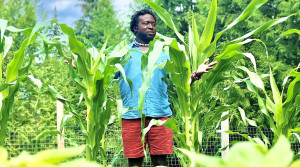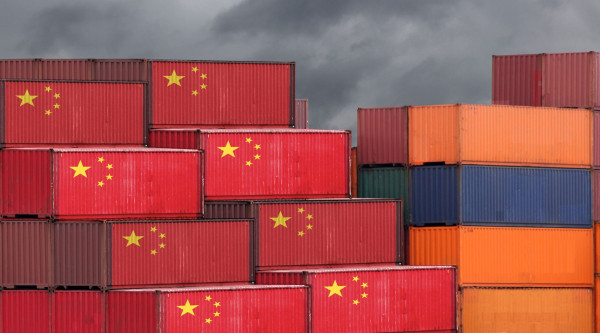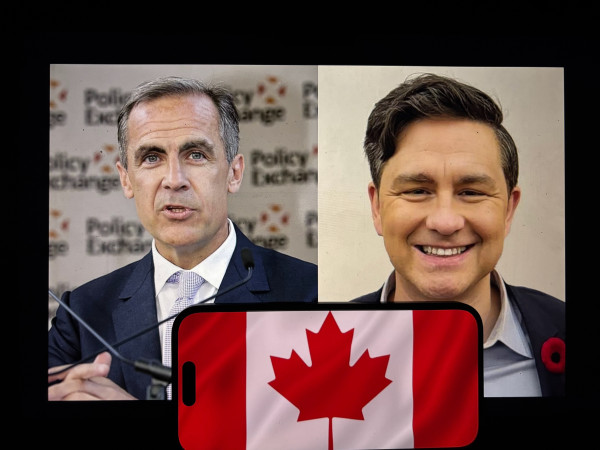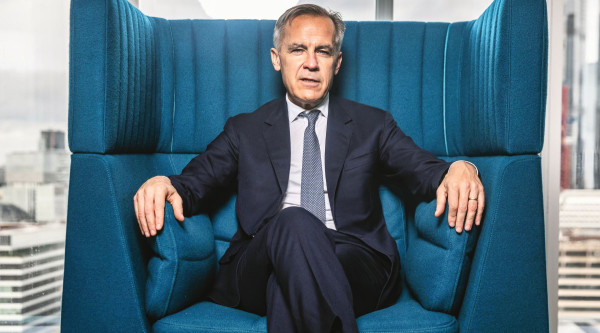Many Canadians' top-of-mind questions this election are: Who’s best suited to stand up to the disruptor-in-chief down south, Donald Trump, and what specifically are the leaders going to do to protect Canada and Canadians? As the campaign has drawn on and Trump has largely stopped threatening our sovereignty, classic election issues like affordability, housing, and healthcare are gaining more attention.
Poilievre and Carney‘s personalities will undoubtedly factor into people’s decisions when casting their ballots — who do you trust? Questions like who you would rather have a beer with have always been the barometer among Canadian voters but in such a consequential election, policy is equally important.
A former governor of the Bank of Canada and Bank of England, Mark Carney is a Harvard and Oxford-educated economist born in the Northwest Territories to a stay-at-home mom and a high school principal father. He was mostly raised in Edmonton, but his job at Goldman Sachs took him all over the world, to Boston, London, New York, Tokyo, and Toronto. He has four honorary degrees and was awarded the Order of Canada.
{https://www.youtube.com/watch?v=_zf4kxzCQsQ}
In the first line of his platform, Poilievre reminds us he was born to a 16-year-old single mother and adopted by “two loving school teachers.” His adoptive parents divorced when he was a teen, with his father coming out as gay. In 2005, Poilievre voted against same sex marriage.
Like Carney, Poilievre was also raised in Alberta, but that is where their similarities end. Poilievre started working for the Conservatives by age 16, selling memberships and canvassing over the phone. He graduated from the University of Calgary wth a degree in international relations. He has no private sector experience, aside from briefly running a political consulting firm. Poilievre’s career has been limited to various roles in the Conservative party, including a stint as Minister of Democratic Reform in 2011 and Minister of Employment in 2015.
{https://www.youtube.com/watch?v=8D61CaUuZm0}
The two leaders have laid out their visions for the country in their costed platforms and defended their policy ideas during two debates and in front of journalists. But in addition to dissecting who’s promising what, it’s worth looking at what they’ve said and where they’ve stood on some of the key election issues.
Housing
Carney plans to create a new federal entity, Build Canada Homes, to partner with private builders and act as a manager and developer of affordable housing projects. The Liberals' platform also pledges to remove GST for first-time homebuyers on new and majorly renovated homes under $1.5 million. Other commitments include increasing the conversions of existing buildings into affordable housing units and halving development fees for multi-unit buildings, which developers say account for 20% to 30% of the cost of a new home.
The Liberals claim their plan will create almost 500,000 new homes a year.
{https://www.youtube.com/watch?v=6APy8UlTsYo}
Carney has cancelled a Trudeau budget announcement to increase the capital gains tax from 50% to 66.7%. Capital gains refers to the profit you make from selling something like your home, a cottage or a business. A Carney government would cancel that proposed increase.
Poilievre promises to go one step further and says, “Any person or business selling an asset will pay no capital gains tax when they reinvest the proceeds in Canada until the end of 2026.”
During his time as Bank of Canada governor, Carney committed to keeping a 0.25% interest rate. This gave Canadians the confidence to spend, which created a boom for the housing market and construction industry. Carney’s critics say this decision drove house prices 30% higher and resulted in Canada having the third most overvalued housing market at the time, according to the Organization for Economic Co-operation and Development.
The Conservatives plan to cut the GST on new homes up to $1.3 million. They’d also tie federal funding to cities to the number of housing starts and award bonuses to municipalities that build more homes than expected or remove development taxes. However, failing to meet targets would result in less infrastructure funding. Poilievre also intends to end the Underused Housing Tax and the Housing Accelerator Fund, but sell 15 per cent of federally owned buildings and use the land to build affordable homes. During the campaign, he’s pledged to build 2.3 million homes in the next five years.
{https://www.youtube.com/watch?v=C8M7mslgskg}
Parts of Poilievre’s housing platform is consistent with his previous positions and mirrors the Building Homes Not Bureaucracy Act (Bill C-356) he put forward in 2023.
In the last session of Parliament, Poilievre supported the Liberals' Affordable Housing and Groceries Act (Bill C-56), which aimed to address housing affordability by offering tax breaks to developers to encourage more construction of purpose-built rental projects. At a time when high interest rates and material costs were slowing the pace of home builds, Poilievre supported the Act.
Poilievre voted against the Liberals’ Bill C-31, the Cost of Living Relief Act, which would’ve provided a one-time rental housing benefit for eligible applicants through establishing the Rental Housing Benefit Act.
Government spending
One of the predicted consequences of a trade war with the United States is a significant economic slowdown, resulting in job losses or reduced hours for Canadians, similar to what we saw during the pandemic.
In 2021, Carney served as an informal advisor to Justin Trudeau during the COVID-19 pandemic. Carney said the government made the right call pouring massive amounts of money into programs like the Canada Emergency Response Benefit (CERB).
Carney saw the financial support the government provided as an appropriate way to help Canadians through an economic crisis but argued that governments around the world would need to reign in emergency spending.
Those sentiments ring true in the Liberals' new platform. The party promises nearly $130 billion in new measures over the next four years, adding $225B to the federal debt when factoring in existing spending.
“We are in the middle of the biggest crisis of our lifetimes,” Carney told a crowd of supporters. "This is a plan that meets that moment in a way that is very prudent with people's hard-earned tax dollars but bold in terms of where this country can go."
The Liberals plan to reduce public spending by capping the size of the public service and attempting to make government operations more efficient. Their costed platform shows the government running a "small deficit" on capital spending but balancing the operational spending budget within three years.
{https://www.youtube.com/watch?v=spsK_vDhfXE}
Poilievre says the Conservatives would manage the government spending similarly to a small business or a senior. He emphasized his commitment to use taxpayer money responsibly by invoking his mother, a retired teacher.
“If she would not be happy with it coming out of her retirement funds, then I should not be happy spending it. Canadians have been pinching pennies long enough. It’s time for the government to start pinching pennies as well.”
Poilievre says his Conservative government would cut the existing deficit by 70 per cent through means like cutting back on government consultants and reducing the number of federal employees, selling federal buildings and land, defunding the CBC, cracking down on tax evasion as well as cutting regulations by 25 per cent and limiting foreign aid. The Conservatives would also introduce a “dollar-for-dollar” policy, requiring the government to find a dollar of savings for every new dollar spent.
{https://www.youtube.com/watch?v=JYFROmLEQjA}
Poilievre regularly opposes additional government spending, including voting against last winter’s GST holiday as well as several NDP-led bills that would’ve provided funding for pharmacare, dental care and school food programs, for example. Poilievre has voted against several budgets and economic statements the finance minister has put forward as well as criticized the Liberals spending record and priorities throughout his time as leader.
It’s worth noting that the GST was introduced by the Conservatives’ Brian Mulroney government in 1991, and the HST was ushered in by the Conservatives’ Stephen Harper government in 1997.
While Justin Trudeau cited lowering income tax for the middle class from 22% to 20% as part of his legacy, his Liberal government also eliminated several tax credits that helped the middle class, such as children’s fitness and arts credit, public transit tax credits and income splitting.
Climate
There is scant mention of climate change in the Conservative platform whereas the Liberal platform dedicates an entire section to “Protecting Nature.”
Carney’s Liberals removed the divisive consumer carbon tax before the election, and they’re pledging to tighten the output-based pricing system for large industrial emitters if they return to power. The Liberals plan to tax imports from countries that don’t have comparable carbon pricing. Carney’s platform also includes a pledge to phase out the use of fossil fuels in government buildings by 2030.
While serving as the Bank of England Governor, Carney warned that companies and industries that fail to move towards zero-carbon emissions will be punished by investors and go bankrupt. He also said there’s a possibility that the global transition necessary to tackle the climate crisis could result in an abrupt financial collapse.
“Achieving net zero emissions will require a whole economy transition,” he told The Guardian. “This could turn an existential risk into the greatest commercial opportunity of our time.”
{https://www.youtube.com/watch?v=qwlDXfC1Y1U}
At the time, Carney said achieving a grand transition like that would require funding for green initiatives without abandoning what he’s recently called “conventional energy.” As Liberal leader, Carney said the party would be open to discussing pipelines and expediting energy projects.
The Conservatives want to eliminate all carbon pricing and boost incentives, like expanding tax credits for businesses and manufacturers that reduce emissions, and promote clean energy technologies.
{https://www.youtube.com/watch?v=WdWhhP1X4eI}
Poilievre has consistently opposed two key Liberal environmental policies: the Carbon Tax (which Carney scrapped on day one when he became PM) and the ban on single-use plastics like straws and grocery bags (which Poilievre says his government would reverse), as well as a bill intended to focus on the transition to a zero-emissions green economy.
Immigration
The Conservatives promise to reduce the number of non-permanent residents in Quebec, which was 597,140 in 2024, and would give the province more jurisdiction to choose temporary immigrants. Poilievre says his government would link Canada's population growth rate to a level below the number of new homes built, and consider factors such as health care access and jobs. Poilievre expressed this view last August and proposed that Canada accept around 250,000 newcomers a year.
At the time, Poilievre accused Trudeau-led governments of breaking the "multigenerational consensus" that people immigrating to Canada is a good thing by accepting too many international students and low-wage temporary foreign workers.
"The radical, out-of-control NDP-Liberal government has destroyed our system," Poilievre said.
{https://www.youtube.com/watch?v=-eXu-0hZvWA}
The Conservative platform also calls for a cap on the number of asylum seekers Canada accepts and promises to crack down on fraud connected to international students and temporary workers.
In October, the Liberal government said it would reduce its target of new permanent residents brought into the country by 21 per cent from 500,000 to 395,000 this year. Carney-led Liberal government says it would keep the immigration caps until it determines Canada has the capacity to accept more newcomers.
Carney says his government would cap the number of non-permanent residents in Canada at less than 5 per cent of the population, and limit the annual growth of permanent residents to less than one per cent annually.
{https://www.youtube.com/watch?v=uQlMSLi4j_k}
The platform also throws Trudeau under the bus, saying his government “let immigration levels grow at a rapid and unsustainable pace,” straining housing, public infrastructure and social services. The party is now promising to limit the number of newcomers coming to Canada to ensure there’s adequate housing and other supports.
“The government has a responsibility to those who come here to ensure that they have access to jobs, social services, and housing,” the platform states.
“If we cannot meet those responsibilities, we need to adjust the numbers until we get back on track.”
Interprovincial trade and job protection
When it comes to improving trade between provinces, Poilievre proposes “ending the ban on interprovincial alcohol shipments so Canadians can buy and sell across provincial borders” and introducing a Free Trade Bonus “that rewards provinces that lower trade and labour mobility barriers.”
{https://www.youtube.com/watch?v=88fjYoXzJRA}
Carney wants to do the same thing, and promises "free trade by Canada Day".
{https://www.youtube.com/watch?v=6cQqzzUAkwU}
Carney wants to go a step further and invest in high-speed rail that connects communities between Windsor and Québec City. He also wants to build more ports, highways, railways, and energy infrastructure. Both candidates ask the provinces to agree to “mutual recognition of credentials”. That means a health professional, or a financial services professional should be able to take their certificates and be accepted to work in any province.
To protect Canadian jobs, Poilievre proposes to:
• Cut the federal sales tax on Canadian-made vehicles and launch a Keep Canadians Working Fund until US tariffs are lifted to protect the jobs of autoworkers directly targeted by Trump’s trade war.
• Implement a Buy Canada procurement policy so that federally funded infrastructure and defence projects prioritize Canadian companies employing Canadian workers and using Canadian materials.
• End federal rebates for made-in-China EVs to protect Canadian auto workers and our national security.
Carney’s platform is thin on details but heavy on rhetoric when it comes to protecting jobs. Carney has an ambitious vision of an “All-in-Canada” network for auto manufacturing component parts. “With this network, we will work with industry to build more car parts in Canada, limit those parts crossing the border during production, and attract investment into our own industry.” The platform also includes a whopping $2 billion Strategic Response Fund to “boost our auto sector’s competitiveness, protect manufacturing jobs, support workers to upskill their expertise in the industry.”
Crime
The Liberals propose shifting the burden of proof to the accused to make it harder for people charged with violent car theft, organized crime, home invasions and certain human-trafficking and smuggling offences to get bail.
They’d also upgrade murder charges involving intimate partner or sexual violence to a constructive first-degree murder offence and introduce harsh penalties for the non-consensual distribution of sexual deepfakes and intimate images.
Carney is proposing legislation to criminalize intentionally obstructing access to places of worship, schools, and community centres or to threaten people using services at those sites.
The Conservative platform contains several tough-on-crime measures, including consecutive sentences for convicted mass murderers, implementing a “three-strikes-and-you’re-out” law which would make criminals convicted of three offences ineligible for bail, probation, parole or house arrest and come with a minimum 10-year sentence.
Poilievre says he’d impose mandatory life sentences on anyone convicted of trafficking, production and distribution of over 40 mg of fentanyl. A proposal that was developed in response to Trump’s bogus border concerns.
{https://www.youtube.com/watch?v=L8irjEgWP2M}
A Conservative government plans to deliver harsher sentences for people convicted of abusing an intimate partner and require strict bail conditions for anyone accused of intimate partner violence. Conservatives say they’d pass legislation to hold banks and telecom companies accountable for catching scams and fine companies $5 million if they don’t use the latest technology to prevent scams. Fraudsters would be hit with mandatory jail time and fines.
Poilievre has also pledged to use the notwithstanding clause, which no federal government has ever done. The clause would allow him to override rulings on legislation that judges have determined would violate sections of the Charter of Rights and Freedoms for a five-year period. Poilievre says he would use it to write a law to enforce consecutive life sentences (a policy that the Supreme Court struck down) so that people convicted of multiple murders would “die in jail”.
Carney calls it a “dangerous step”. In response to a journalist on the campaign trail, Carney said, “Politicizing certain issues with respect to fundamental rights is a slippery slope. We will defend the charter rights of Canadians on principle because it's the right thing to do.”
Philosophy and Values
You’ll often hear apathetic voters lamenting that candidates “are all the same”. But what’s obvious this time is that Carney and Poilievre represent very different versions of Canada. The Conservative platform is focused on individualism and “letting businesses and people decide” what they want, whereas the Liberal platform focuses on “collective good” and welcoming and supporting “all Canadians”. These are two very different philosophies.
Poilievre has said a Conservative government would “put an end to the imposition of woke ideology in the federal civil service and in the allocation of federal funds for university research.” And that the military should “be guided by a warrior culture, not a woke culture.”
{https://www.youtube.com/watch?v=TnoFYwHYM8A}
Where Poilievre has vowed to "slash money for special interests" and suggests that diversity, equity, and inclusion “further divide Canadians,” Carney has doubled down on the necessity for equality. His platform highlights the Liberals' implementation of $10 a day daycare (which Poilievre voted against but has promised to maintain if elected), the Black Entrepreneurship Program, and the Canadian Dental Care Plan for seniors.
Carney's platform contains a section on reconciliation with Indigenous Peoples, including pledges to:
- Move forward on the implementation of the National Inquiry into Missing and Murdered Indigenous Women and Girls Calls for Justice and the National Action Plan.
- Protect K-12 education on-reserve so that more First Nations kids can go to school surrounded by their language, culture, and communities.
- Immediately introduce and pass legislation affirming that First Nations have a human right to clean drinking water.
- $2.5 billion for new infrastructure in Indigenous communities.
Poilievre’s platform only mentions Indigenous people in relation to economic reconciliation, which promises to “allow Indigenous Peoples to access equity ownership in major resource projects.” The Conservative platform also refers to “our Indigenous people”, an oft-repeated, well-intentioned but demeaning phrase that denotes ownership over Indigenous people.
There is no acknowledgment of the atrocities committed against Indigenous Peoples. Instead, Poilievre focuses more on “celebrating Canada’s story” with a proposed edit to the Canadian citizenship oath to include, “I pledge gratitude to those who worked, sacrificed, and gave their lives to defend the freedom I now enjoy and to build the country of Canada I now call home.”
And when it comes to addressing identity-based threats, the Liberals seek to make it a criminal offence to intentionally and willfully intimidate or threaten anyone attending religious services, and recommits to funding the safety of 2SLGBTQI+ people. It also pledges billions in gender and equity-related programming.
The Conservative platform does not mention 2SLGBTQI+ anywhere.
The Conservative platform specifically mentions Jewish, Chinese and Sikh communities and the creation of an anti-hate task force to support them. The Black community is not mentioned anywhere in the platform.
Anti-Black racism isn’t mentioned in this section of the Liberals' platform either, but there is an acknowledgement of the specific challenges faced by Black Canadians in other parts of the platform and a pledge of $160 million to make the Black Entrepreneurship Program permanent.
One thing both Carney and Poilievre have in common is that they’ve been in the public eye for the better part of two decades. The good thing is, they’re both pretty consistent in their worldview, which helps when trying to figure out which party you’re aligned with.
Carney represents a globalist, pragmatic approach with emphasis on stability, sustainability, investment and evidence-based policy.
Poilievre champions free-market, limited government principles, emphasizing individual responsibility, fiscal conservatism, and skepticism regarding government expansion.
It’s important to know where both of these men have come from, as that will undoubtedly impact where they are going.
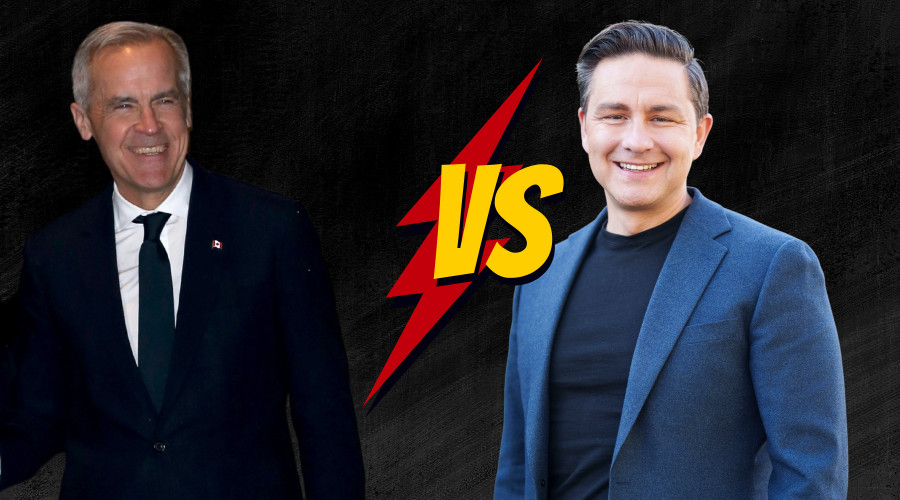
 By
By 




